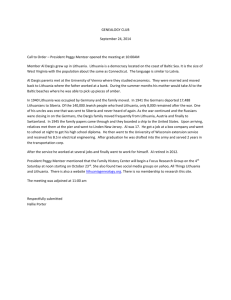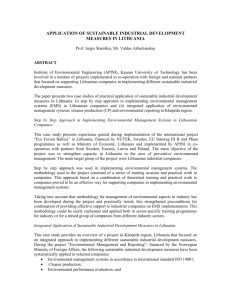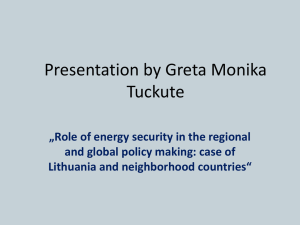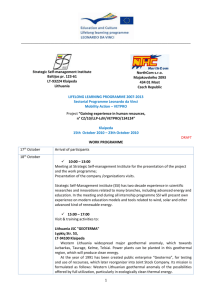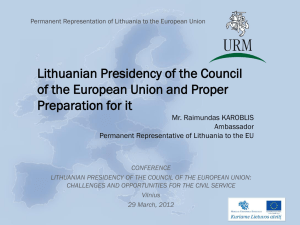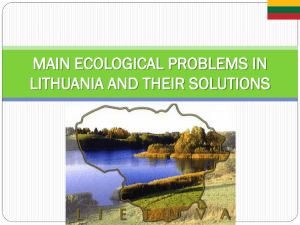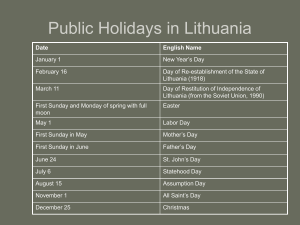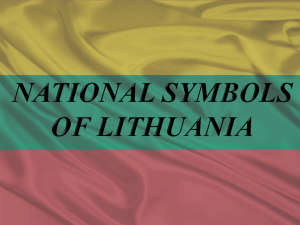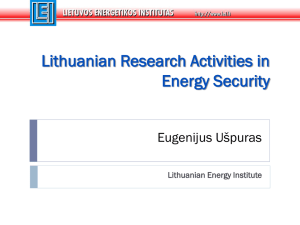Accord between the political parties represented in the Seimas of
advertisement
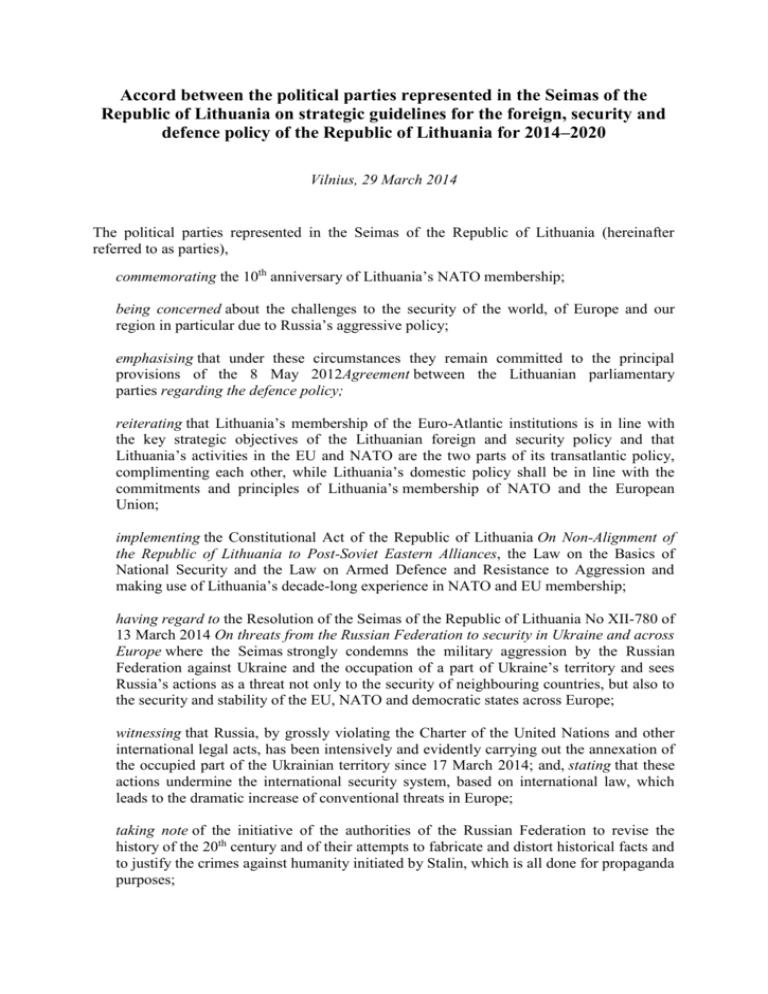
Accord between the political parties represented in the Seimas of the Republic of Lithuania on strategic guidelines for the foreign, security and defence policy of the Republic of Lithuania for 2014–2020 Vilnius, 29 March 2014 The political parties represented in the Seimas of the Republic of Lithuania (hereinafter referred to as parties), commemorating the 10th anniversary of Lithuania’s NATO membership; being concerned about the challenges to the security of the world, of Europe and our region in particular due to Russia’s aggressive policy; emphasising that under these circumstances they remain committed to the principal provisions of the 8 May 2012Agreement between the Lithuanian parliamentary parties regarding the defence policy; reiterating that Lithuania’s membership of the Euro-Atlantic institutions is in line with the key strategic objectives of the Lithuanian foreign and security policy and that Lithuania’s activities in the EU and NATO are the two parts of its transatlantic policy, complimenting each other, while Lithuania’s domestic policy shall be in line with the commitments and principles of Lithuania’s membership of NATO and the European Union; implementing the Constitutional Act of the Republic of Lithuania On Non-Alignment of the Republic of Lithuania to Post-Soviet Eastern Alliances, the Law on the Basics of National Security and the Law on Armed Defence and Resistance to Aggression and making use of Lithuania’s decade-long experience in NATO and EU membership; having regard to the Resolution of the Seimas of the Republic of Lithuania No XII-780 of 13 March 2014 On threats from the Russian Federation to security in Ukraine and across Europe where the Seimas strongly condemns the military aggression by the Russian Federation against Ukraine and the occupation of a part of Ukraine’s territory and sees Russia’s actions as a threat not only to the security of neighbouring countries, but also to the security and stability of the EU, NATO and democratic states across Europe; witnessing that Russia, by grossly violating the Charter of the United Nations and other international legal acts, has been intensively and evidently carrying out the annexation of the occupied part of the Ukrainian territory since 17 March 2014; and, stating that these actions undermine the international security system, based on international law, which leads to the dramatic increase of conventional threats in Europe; taking note of the initiative of the authorities of the Russian Federation to revise the history of the 20th century and of their attempts to fabricate and distort historical facts and to justify the crimes against humanity initiated by Stalin, which is all done for propaganda purposes; 2 recognising that the Russian revisionist policy in Eastern and Central Europe is the main and long-term foreign policy challenge, and that the main threats to Lithuania’s national security stem from this Russian policy, which cannot be eliminated by making concessions or one-sided promises to “reset” the relations that depend not only on Lithuania’s expectations but also on the intentions, aims and actions of Western countries and Russia in the region; that economic cooperation between the Republic of Lithuania and the Russian Federation poses challenges to the country’s national security, and that this Russian policy may lead to higher vulnerability of Lithuanian business actors; guided by the commitment of a member country, undertaken by the Republic of Lithuania under Article 3 of the North Atlantic Treaty, to maintain and develop individual and collective capacity to resist an armed attack; acknowledging the exceptional role of the United States of America, as the leading country of NATO, in ensuring the security of the European and transatlantic community; considering that reinforcement of military cooperation with the US and the US military presence in assisting to ensure the security of both the Baltic States and a wider Nordic and Central European region is of vital importance; realising that Lithuania’s energy dependence on gas imports from the monopolistic supplier, the reliance of the Lithuanian electric energy system on the post-soviet IPS/UPS system, and the prevailing electric energy imports from this system pose a real threat to Lithuania’s national security, and this is why Lithuania’s integration into the European energy system is of vital necessity; seeking to respond to the new challenges to our country’s foreign, security and defence policy, the parties agree on: General national security tasks and activities 1. Development and strengthening of democracy, ensuring safety of all the population of Lithuania, safeguarding internal and external national security, deterrence of every potential attacker, and protection of independence, democracy, territorial integrity, and constitutional system of the Lithuanian state by concerted actions of the state and its citizens. 2. Support for further EU integration in the sectors that ensure the security of EU member states particularly by increasing EU’s energy independence, creating a common EU energy and transport infrastructure, and implementing a common external energy policy; joining the Economic and Monetary Union (EMU) and introduction of the Euro in 2015. 3. In cooperation with the European Commission and partner states, as early as possible implementation of the strategic projects aimed at integration of Lithuania’s energy infrastructure into the European energy systems stipulated in the Baltic Energy Market Interconnection Plan (BEMIP) and the National Energy Independence Strategy approved by the 26 June 2012 Resolution of the Seimas of the Republic of Lithuania No XI-2133: Gas sector: the projects to construct the liquefied natural gas (LNG) terminal with connecting networks and a link between the gas pipeline networks of Poland and 3 Lithuania and to take over by the state the route pipeline owned byAB Amber Grid prior to the commissioning of the LNG terminal; Power sector: the project of the Visaginas nuclear power plant under the funding and participation conditions improved as a result of negotiations with the partners aimed to expand the independent and competitive basic generation capacity; projects to complete the NordBalt power cable between Lithuania and Sweden, install power transmission links with Poland and thus ensure that Lithuania’s network is interconnected into and operated synchronously in the continental European network. With the aim of delivering energy security, projects to ensure diversification of energy supply, to explore the existing domestic energy resources and create the conditions for their extraction. The parties commit to the completion of the above projects, to political support thereto and protection from attempts by any interest groups or third parties to discredit the projects. 4. In the context of strategic integration of the Lithuanian railway infrastructure into the European transport system, completion by 2015 of the Rail Baltica section of the European track gauge as the first stage of the joint transport infrastructure project of EU significance and launch of the second stage in line with the decisions coordinated with the European Commission regarding the route, parameters and funding scheme. 5. Support for further EU and NATO enlargement with the focus on Eastern Partnership countries, in particular on Ukraine, Georgia and Moldova, in order to accelerate their rapprochement with the community of Euro-Atlantic nations, to conclude free trade and visa facilitation agreements with those countries, to resolve their frozen conflicts and ensure their territorial integrity. Ensuring of military security 6. Effective contribution to the implementation of the provisions of the NATO’s Strategic Concept. Participation, within the capacity of Lithuania, in conflict prevention, crisis management, civilian missions and peace-keeping military operations of NATO, the EU, the United Nations and the OSCE. 7. Enhancement of strategic cooperation with the US, especially in the areas of energy, economic and military security; underpinned by the provisions and principles of the Charter of Partnership among the United States of America and the Republic of Estonia, Republic of Latvia, and Republic of Lithuania, seeking permanent direct presence of US military capabilities and possibly, in line with NATO plans, of military capabilities of other members of the Alliance in the territories of the Baltic States. 8. Using the opportunities provided by enhanced cooperation with the US and the Nordic and Baltic countries in the area of defence through joint participation in the Enhanced Partnership in Northern Europe (E-PINE). 9. In response to the changing geopolitical and security situation in Europe after Russia’s aggression in Ukraine and annexation of Crimea, a part of the territory of Ukraine, fulfilment of commitments of membership of NATO and other international organisations by consistently and annually increasing allocations for national defence for them to reach 2% of GDP by 2020. 4 10. Establishment, on an annual basis, of the pace for medium-term gradual increase in allocations for national defence, laid down in Paragraph 9 of this Accord, by a resolution of the Seimas. Allocation of gradually increasing state budget appropriations for defence purposes, as a matter of priority, for supply of man-portable anti-tank and short- and middle-range air defence munitions as well as infantry combat vehicles to the sub-units of land forces, for training of reserve personnel, effective maintenance of stand-by reserve identified for mobilisation, and building and development of an information and cyber defence system. 11. Increase of the country’s deterrence potential by strengthening the protection of the state border with Belarus and the Kaliningrad Region (Russian Federation); coordination, in case of need, of the necessary measures of military self-defence with the Republic of Poland; aiming at greater US and NATO engagement in the defence of Nordic and Central Europe, with the main focus on enhancing Lithuania’s airspace surveillance and control system and enemy deterrence skills applied in air, land and sea; seeking permanent presence of military units of NATO allies and of collective security capabilities of the Alliance in the Baltic region; support for the development of NATO’s missile defence system, its infrastructure, human resources and its enhanced airspace surveillance and control in those regions. 12. Encouragement of development of an effective national civil resistance system providing for opportunities for citizens of the Republic of Lithuania to contribute to national defence. Reinforcement of soft power in prevention 13. Strengthening of Lithuania’s intelligence institutions, in particular human intelligence and active counter-intelligence measures; raising public awareness of challenges to national security; constant and adequate provision of information to society about threats to national security and active engagement in prevention of hostile propaganda in Lithuania in history, politics, education, culture and other areas. 14. Restriction, by legal means, of the possibility of information wars against Lithuania, restriction and elimination of information channels used for attacks and propaganda against the state of Lithuania and for disinformation in the public domain and cultural area; mobilisation of the efforts of public institutions for improving the effectiveness of national defence against information warfare. 15. Development of patriotic and active citizenship of pupils and young people at school and encouragement of their engagement in the activities of the Lithuanian Riflemen’s Union and other patriotic organisations. 16. Further development and strengthening of democracy, holding onto the fundamental values recognised universally in Europe, ensuring the enforcement of fundamental human rights and respect for the rights of national minorities, and adoption of the Law on National Minorities. 17. Substantial reinforcement of national capabilities for carrying out cyber-defence by establishing an institution under the Ministry of National Defence for this purpose and for 5 coordinating the activities of other institutions; bringing together volunteers capable of contributing to reinforcement of Lithuania’s capabilities in cyber defence. Final conclusions 18. This national Accord shall be in force until the end of 2020 and shall be implemented in regular activities of public authorities and by adopting respective legal acts regardless of election cycles, campaigns, outcomes and changes in political government. 19. A discussion on the foreign, security and defence policy of the Republic of Lithuania shall be held at a plenary sitting of the Seimas of the Republic of Lithuania once a year. 20. Until this Accord expires, the Government of the Republic of Lithuania and delegates from the parties that have signed the Accord shall consider and assess the progress of the implementation of this Accord each year before the adoption of the national budget. For the parties of the Accord: Algirdas Butkevičius Chairman of the Social Democratic Party of Lithuania Loreta Graužinienė Chair of the Labour Party Andrius Kubilius Chairman of the Homeland Union – Lithuanian Christian Democrats Kęstas Komskis Deputy Chairman of the Party “Order and Justice” Eligijus Masiulis Chairman of the Liberals’ Movement of the Republic of Lithuania Aurelija Stancikienė Deputy Chair of “The Way of Courage” Political Group at the Seimas Jaroslav Narkevič Member of the Lithuanian Poles’ Electoral Action
